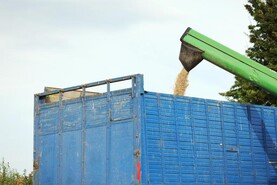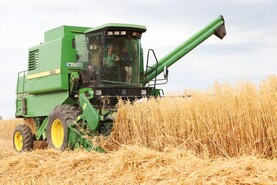At last week’s Cereals event in Lincolnshire the Agriculture and Horticulture Development Board (AHDB) released the results of its planting survey a week earlier than usual.
The area of cereals and oilseed rape planted in the UK was down 1%. Rain deluges at winter planting and payment under the Sustainable Farming Incentive (SFI) for placing land in environmental schemes contributed to this.
Wheat area is up 6%, but it is still below the five-year average of 1,648m hectares. However, yields are not heading for any records and this might see lower volumes of cereals crossing the Irish Sea this season.
Speaking to the Irish Farmers Journal’s Tillage Podcast Millie Askew, lead analyst of cereals and oilseeds at the AHDB, said: “As of late May we were expecting 36% of the winter wheat and 50% of the spring wheat area to be in good to excellent condition.”
This is a significant drop from 2023’s estimate of 85% and 2024’s estimate of 55% in good or excellent condition.
Winter barley area is at its lowest since 2020, while spring barley is back 6% and malting area is back 3%. Malting takes up 65% of the barley area in 2025, with feed accounting for 35%. The condition of those barley crops is also very poor. Some 54% of spring barley is in good or excellent condition compared to 48% of winter barley.
Askew commented that the question now is how much of a difference has the recent rain made to crops. It has helped spring crops more than winter ones and has also washed some nitrogen into the ground, which may help proteins for milling wheat.
However, she did note that crop quality could be an issue given conditions. If crops fail to pass for milling or malting that could see more feed grain on the market for export.
She noted that where the show was in Lincolnshire had seen “exceptionally dry weather” and this was clear in the crops which were extremely clean.
Oilseed rape is at its lowest area since 1983 at 236,000ha, a decline of 19% year-on year helped by flea beetle and pigeon challenges, economics and the availability of SFI payments.
You can hear the full interview on the Irish Farmers Journal’s Tillage Podcast by scanning this QR code.
At last week’s Cereals event in Lincolnshire the Agriculture and Horticulture Development Board (AHDB) released the results of its planting survey a week earlier than usual.
The area of cereals and oilseed rape planted in the UK was down 1%. Rain deluges at winter planting and payment under the Sustainable Farming Incentive (SFI) for placing land in environmental schemes contributed to this.
Wheat area is up 6%, but it is still below the five-year average of 1,648m hectares. However, yields are not heading for any records and this might see lower volumes of cereals crossing the Irish Sea this season.
Speaking to the Irish Farmers Journal’s Tillage Podcast Millie Askew, lead analyst of cereals and oilseeds at the AHDB, said: “As of late May we were expecting 36% of the winter wheat and 50% of the spring wheat area to be in good to excellent condition.”
This is a significant drop from 2023’s estimate of 85% and 2024’s estimate of 55% in good or excellent condition.
Winter barley area is at its lowest since 2020, while spring barley is back 6% and malting area is back 3%. Malting takes up 65% of the barley area in 2025, with feed accounting for 35%. The condition of those barley crops is also very poor. Some 54% of spring barley is in good or excellent condition compared to 48% of winter barley.
Askew commented that the question now is how much of a difference has the recent rain made to crops. It has helped spring crops more than winter ones and has also washed some nitrogen into the ground, which may help proteins for milling wheat.
However, she did note that crop quality could be an issue given conditions. If crops fail to pass for milling or malting that could see more feed grain on the market for export.
She noted that where the show was in Lincolnshire had seen “exceptionally dry weather” and this was clear in the crops which were extremely clean.
Oilseed rape is at its lowest area since 1983 at 236,000ha, a decline of 19% year-on year helped by flea beetle and pigeon challenges, economics and the availability of SFI payments.
You can hear the full interview on the Irish Farmers Journal’s Tillage Podcast by scanning this QR code.






 This is a subscriber-only article
This is a subscriber-only article










SHARING OPTIONS: